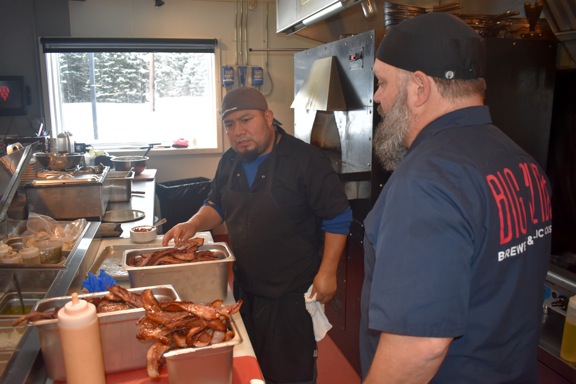SAVOR THE SEASON: Farm-to-table menu at Big Slide Brewery

From left, cook Isaac Hernandez and head chef Greg Sherman are seen at Big Slide Brewery & Public House in Lake Placid Tuesday, Dec. 18. (News photo — Griffin Kelly)
LAKE PLACID – Big Slide Brewery & Public House opened in the summer of 2016. It’s owned by the same company as the Lake Placid Pub & Brewery on Mirror Lake Drive. However, owner Chris Ericson didn’t want Big Slide to be just a second location. It’s a little bit more experimental.
Big Slide doesn’t offer standard pub grub like nachos, chicken wings or burgers. That’s what the Lake Placid Pub & Brewery is for. Instead, Big Slide has menu items such as duck and goat cheese pizza, pork banh-mis and a different oyster dish every Friday.
Head chef Greg Sherman said one the goals from the start was to do something different and have a focus on farm-to-table products.
“It was a mission statement for us,” he said. “We wanted to involve as much local and regional products as we could.”
Sherman said about half of all the food prepared at Big Slide comes from local farms such as Atlas Hoofed It in Sugarbush, Fledging Crow Vegetables and Mace Chasm Farm in Keeseville, Sugar House Creamery in Upper Jay, Asgaard Farm 7 Dairy in AuSable Forks, Wild Work Farm in Keene Valley and Meier’s Artisan Cheese in Fort Covington.
On the menu, for example, people can order the poutine, which features Meier’s cheese curds; a local snack plate with crackers made by Triple Green Jade Farm in Willsboro; What A Fun-Gi brick-oven pizza made with Asgaard Farm chevre; and a This One’s Banh-Mi sandwich made with pork meatballs from Mace Chasm.
Sherman said ordering with a big-name food distributor has its benefits, but there’s more direct communication with local farmers. It’s not like going to a Restaurant Depot. There’s something more personal at the farms, where he can chat with the farmers. Walking into a barn and getting handed a wheel of cheese is as local as you can get.
“Smaller farms deliver once a week,” he said. “It’s direct communication with the actual farmer, which is fantastic because then you get a feel for how things are going for them and what they’re capable of doing for you. So it’s been great. With something like Mace Chasm, Courtney (Grimes-Sutton) is one of the farmers that I have direct contact with, and she’s always willing to work with me. We can talk about new ideas and try different things.”
The difference is in the taste, Sherman said.
“There’s a gargantuan difference in freshness,” he said. “All the stuff that we buy locally, there are no chemicals in the process other than some fertilizers. There are no hormones given to any of these animals, and they’re treated humanely.”
Produce from a local farm like Fledging Crow is fresher, whereas what you get from a big distributor might be toward the end of its life cycle. The animals’ diets at Atlas Hoofed It or Mace Chasm is more natural and nutritious, which is evidenced by better marbling and more inner-muscular fat. Organic cheese is richer and creamier.
One of the more noticeable differences between local food and food from a corporation is the price. Organic is more expensive because it tends to be more labor intensive.
“A lot of it does come at a higher cost,” Sherman said, “but at the same time, it’s going to the farmers themselves. The way I look at it is that we’re just perpetuating what they’re doing and we’re helping them grow and serve us better as a community.
“… But it tastes better. It’s better for the environment. There’s so much more greenhouse emissions transportation-wise when what you’re getting may come from South America. It takes a lot of petrol to get from there to here, whereas all this stuff is from a 30-mile radius of this building.”
Also, there’s the matter of what’s in season. The Adirondacks are in the temperate zone, but much of the year is cold and snowy.
“When you’re working with the local farmers, especially the produce farmers, you’re really subjected to what’s available at the time,” Sherman said. “We have a very short growing season, and so it starts off with just primarily greens. Then we work our way into the storage crops like onions and potatoes and root vegetables. So the menu has to change to reflect that.”
One of the brewery’s providers, Kate Mountain Farm in Vermontville, raises livestock and grows produce. Brewers will order something like beets to make a sour beet beer. The spent grain, or mash, from the brewing will then go back to the farm to feed the animals, which Big Slide later buys for their meat.
There’s a cyclical process of mutualism between Big Slide and local farms.
Learn more about Big Slide Brewery and see its menu online at www.bigslidebrewery.com.



